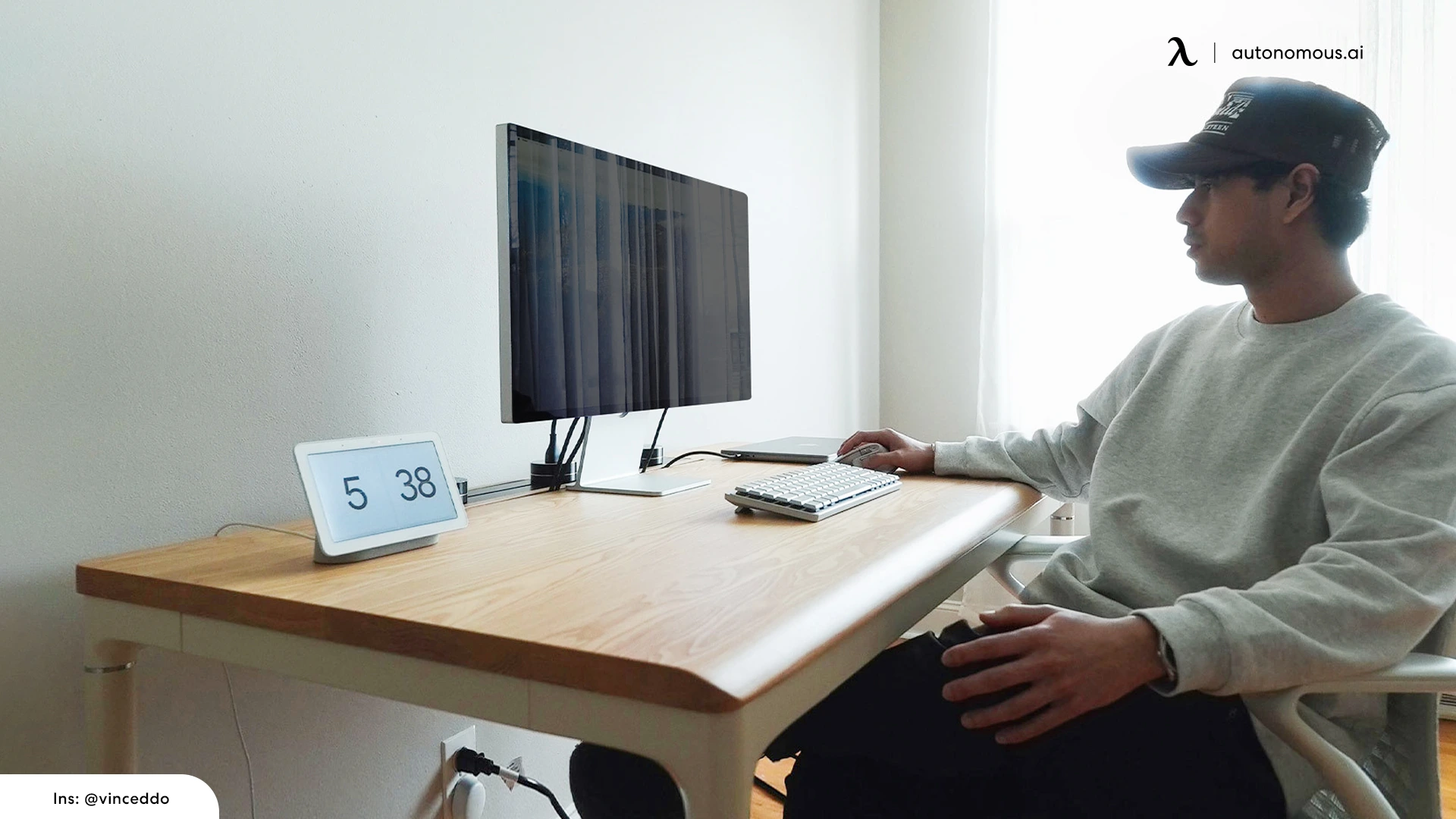
Feng Shui Office Desk: Materials, Placement & Decor Ideas
Table of Contents
A workspace aligned with Feng Shui principles can greatly enhance productivity, focus, and overall well-being. The desk, often considered the heart of any workspace, represents career growth and opportunities. Applying Feng Shui desk principles transforms your workspace into a harmonious and energizing environment that supports success and balance.
This guide delves into desk placement, materials, colors, and accessories, providing actionable tips to create a workspace that fosters clarity and growth.
1. Materials in a Feng Shui Office Desk
The material of your desk plays a crucial role in shaping the energy flow in your workspace. In Feng Shui, each material carries specific properties that influence creativity, focus, and balance. Selecting the right material ensures that your desk aligns with your goals and supports your productivity.
1.1. Wood: A Foundation of Growth and Creativity
Wooden desks are among the most recommended in Feng Shui. As a material, wood symbolizes growth, vitality, and connection to nature. It brings a grounding energy to your workspace, fostering stability while stimulating creativity.
A solid wood desk offers a timeless and natural aesthetic that enhances both functionality and positive energy flow. For those seeking to choose the ideal material, explore the best wood for desktop options to find the right fit for your needs.
For inspiration, check out these bamboo desk setup ideas to harmonize your space. For those who prioritize versatility and health, consider a bamboo standing desk to combine the benefits of wood with the functionality of adjustable height.
Walnut, a darker and richer wood, exudes sophistication and authority. It is an excellent choice for professionals seeking a workspace that reflects leadership and focus. Walnut desks balance practicality with aesthetic appeal, making them suitable for offices that demand both style and productivity. Explore the walnut standing desk for an option that blends elegance with ergonomic features, ensuring a workspace that supports both your physical well-being and career growth.
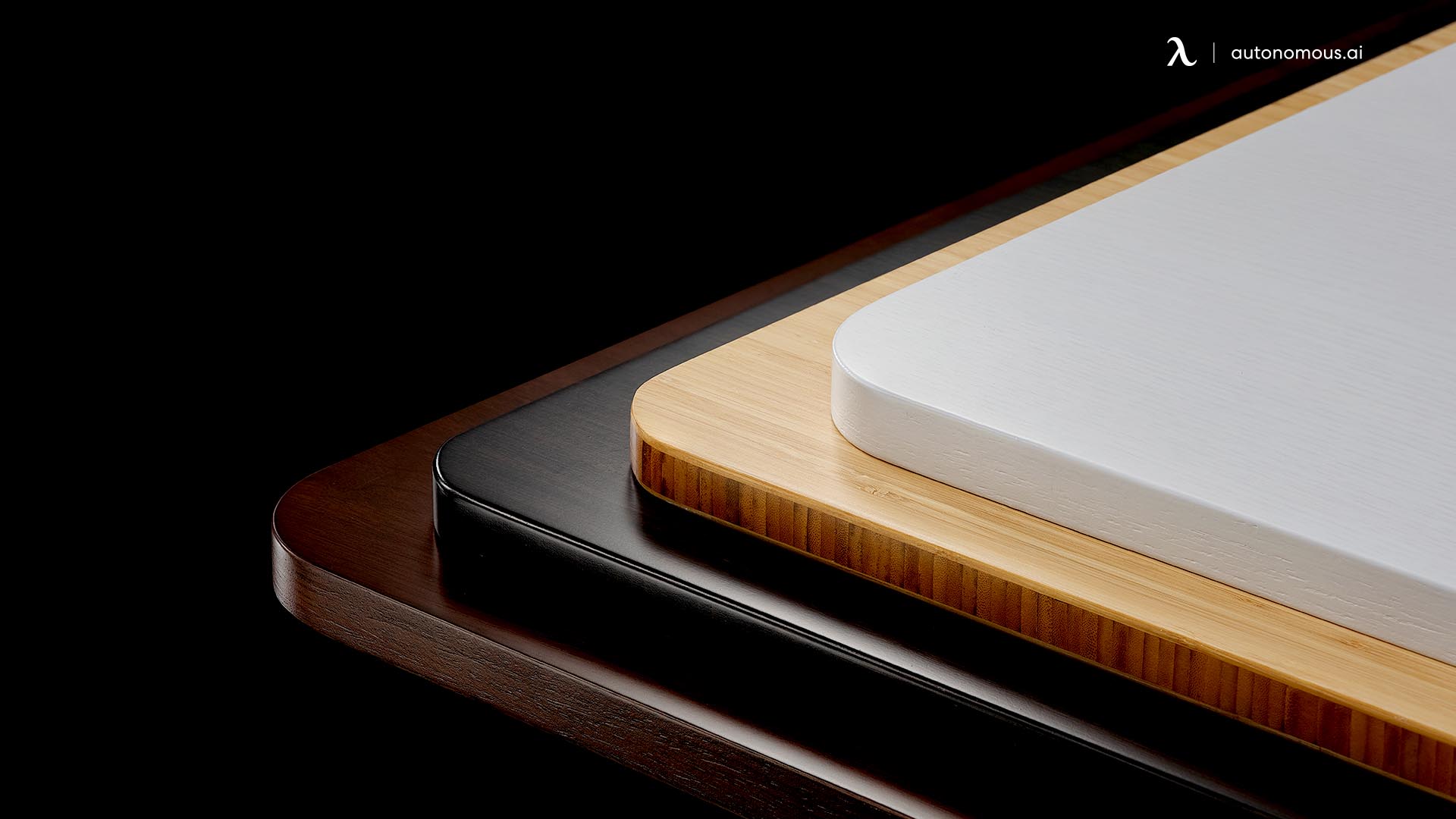
1.2. Metal: Precision and Mental Clarity
Metal is often associated with focus, precision, and the ability to execute tasks with accuracy. A desk with metal components, such as a frame or accents, enhances analytical thinking and organization. However, fully metal desks may feel too cold or rigid, potentially disrupting the balance of energy in your workspace.
To counteract this, combining metal with other materials like wood or adding softer elements (such as a fabric chair or plants) creates harmony. Metal desks are particularly suited for roles that demand sharp mental clarity, such as technical or administrative positions.
1.3. Glass: Clarity and Openness
Glass desks convey transparency and openness, making them suitable for fostering clear communication and vision. However, glass as a material can sometimes scatter energy, which may lead to a lack of focus or grounding.
To stabilize this effect, pair a glass desk with grounding elements like wooden legs or a metal frame. Glass desks work best in environments where clarity and lightness are priorities, such as collaborative or creative spaces. For a more balanced approach, use partial glass designs rather than fully transparent desks.
For those considering adjustable options, explore the best glass top standing desks for a combination of elegance and functionality.
Partial glass designs are often more balanced than fully transparent desks, as they prevent excessive energy dispersion. To decide whether glass is the right choice for your workspace, check out this comparison of wood vs. glass desk tops to find the material that best suits your needs and energy goals.

1.4. Laminate and Composite Materials: Practicality Meets Functionality
Modern laminate and composite desks, often designed to resemble natural materials, provide a cost-effective and practical alternative. These desks symbolize adaptability and functionality, making them a good choice for small or shared workspaces.
When selecting laminate finishes, prioritize those that mimic wood or stone for a natural aesthetic. While laminate desks may lack the inherent energy of wood or metal, they still contribute positively when paired with meaningful accessories or thoughtful desk organization.
1.5. Mixed Materials: A Versatile Solution
Desks combining multiple materials, such as wood, metal, and glass, offer the best of all worlds. Mixed-material desks create a harmonious balance by incorporating the strengths of each material. For instance, a wooden desktop with metal legs provides growth and stability while adding a touch of precision and modernity.
This type of desk is ideal for hybrid workspaces or individuals who value both aesthetics and functionality. The key is to ensure that the materials blend cohesively rather than competing for attention.
Key Considerations When Choosing Desk Materials
The durability and quality of your desk directly influence its symbolic energy. A sturdy, well-made desk reflects stability and longevity, while flimsy or poorly constructed furniture can create feelings of insecurity or imbalance. When choosing a desk, consider how its material resonates with your personal and professional needs, ensuring it complements the overall energy of your workspace.
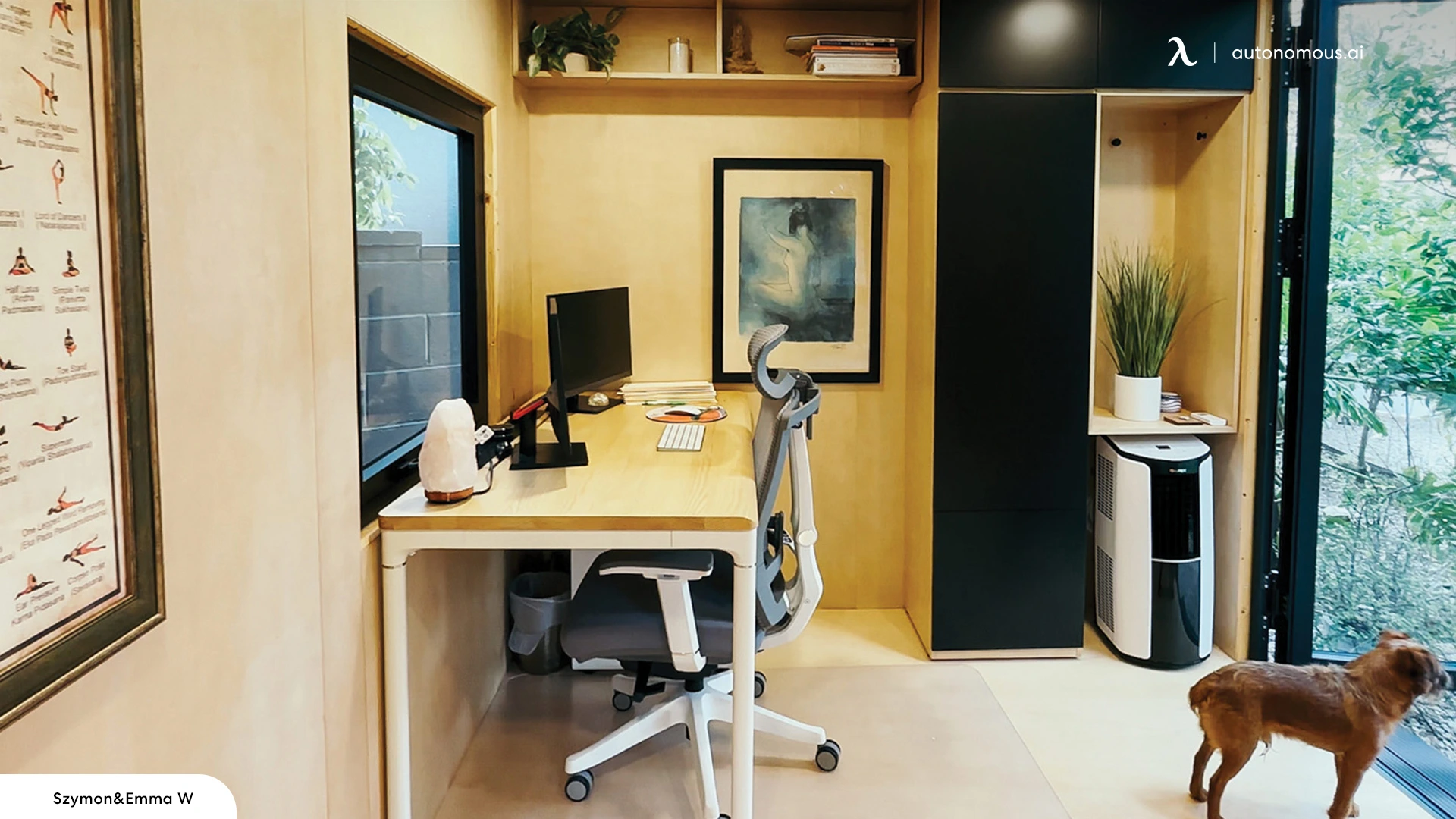
2. Desk Shape in Feng Shui
The shape of your desk significantly influences the flow of energy in your workspace. In Feng Shui, each desk shape carries unique qualities that can enhance productivity, creativity, and harmony. Choosing the right desk shape ensures that your workspace supports your personal and professional goals.
2.1. Rectangular Desks: Stability and Focus
Rectangular desks are the most traditional and versatile choice for a workspace. They symbolize stability, order, and practicality, making them ideal for roles that require focused, consistent effort. The clean, linear design encourages an organized approach to work, ensuring that energy flows smoothly without disruption.
This desk shape works particularly well in spaces where clarity and efficiency are paramount. When paired with the right desk placement, such as the commanding position, a rectangular desk fosters a sense of control and focus, essential for tackling tasks effectively.
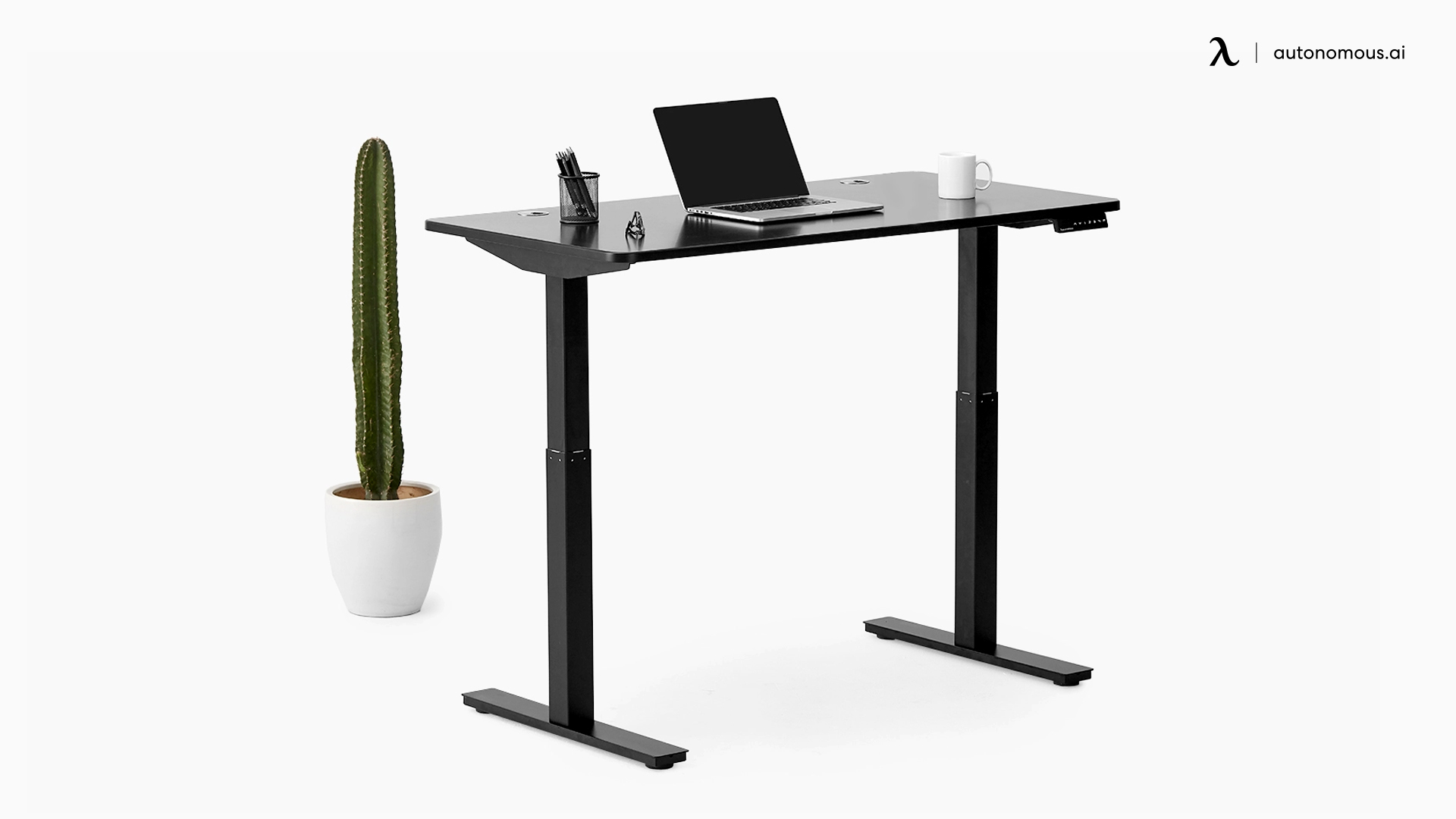
2.2. Curved Desks: Flow and Creativity
Curved desks are perfect for individuals in creative fields or roles that demand innovation. The gentle, flowing shape encourages a natural energy flow, reducing mental blockages and promoting flexibility in thinking.
A curved desk can help soften the energy in a workspace, especially if the room feels rigid or overly formal. It also helps create a more inviting atmosphere, making it easier to feel relaxed and inspired. However, ensure the curve faces inward to embrace the user, creating a sense of support and inclusion.
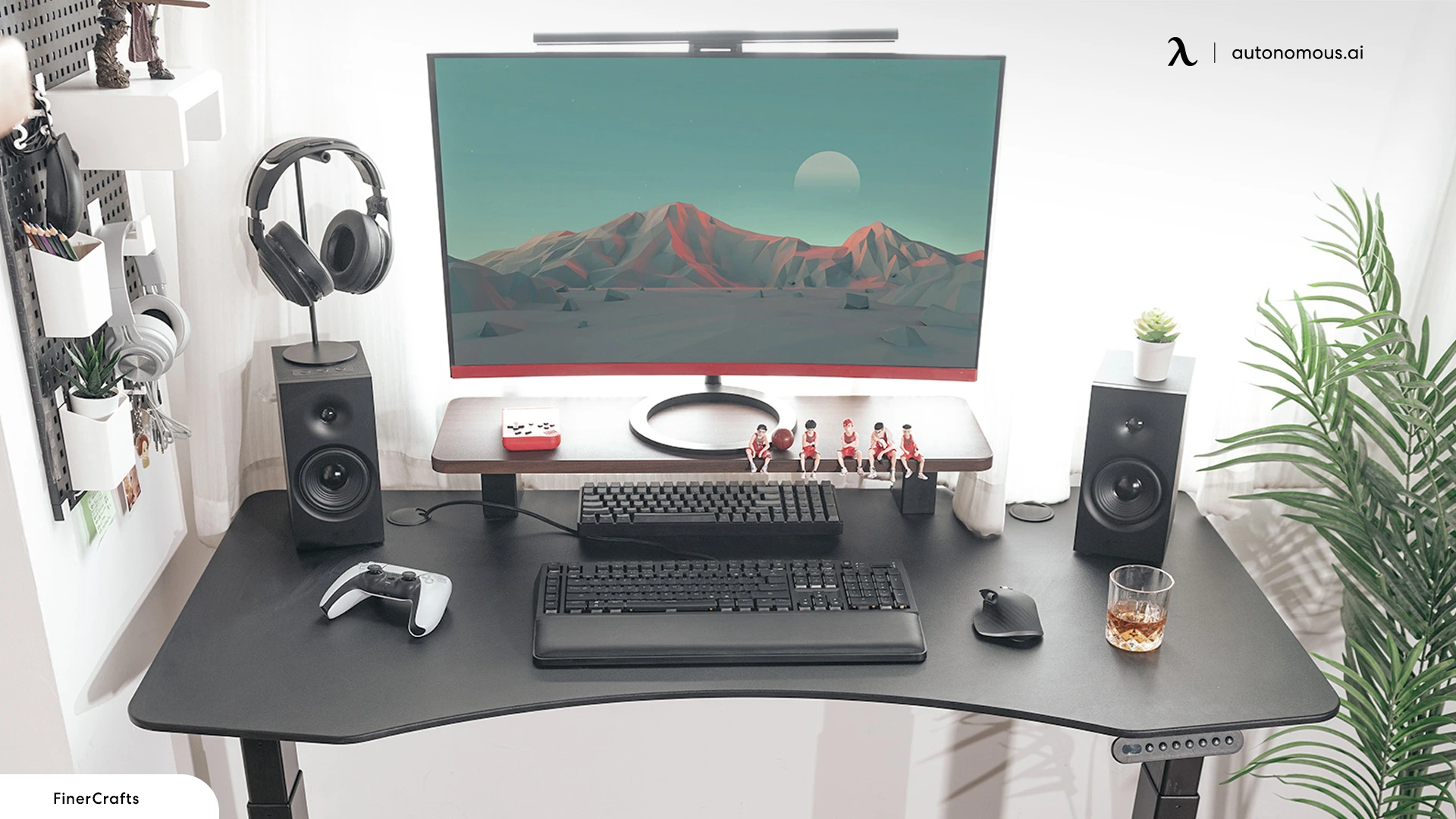
2.3. L-Shaped Desks: Balance and Productivity
L-shaped desks offer a practical solution for maximizing corner spaces while maintaining balance and symmetry in the workspace. This shape is particularly useful for multitaskers who need separate zones for different activities, such as writing, designing, or managing paperwork.
The extended surface area of an L-shaped desk allows for better organization, ensuring that everything you need is within easy reach. According to Feng Shui, this desk shape can help create a sense of completeness and security, provided the open ends do not point directly at a door, which can lead to energy dissipation.
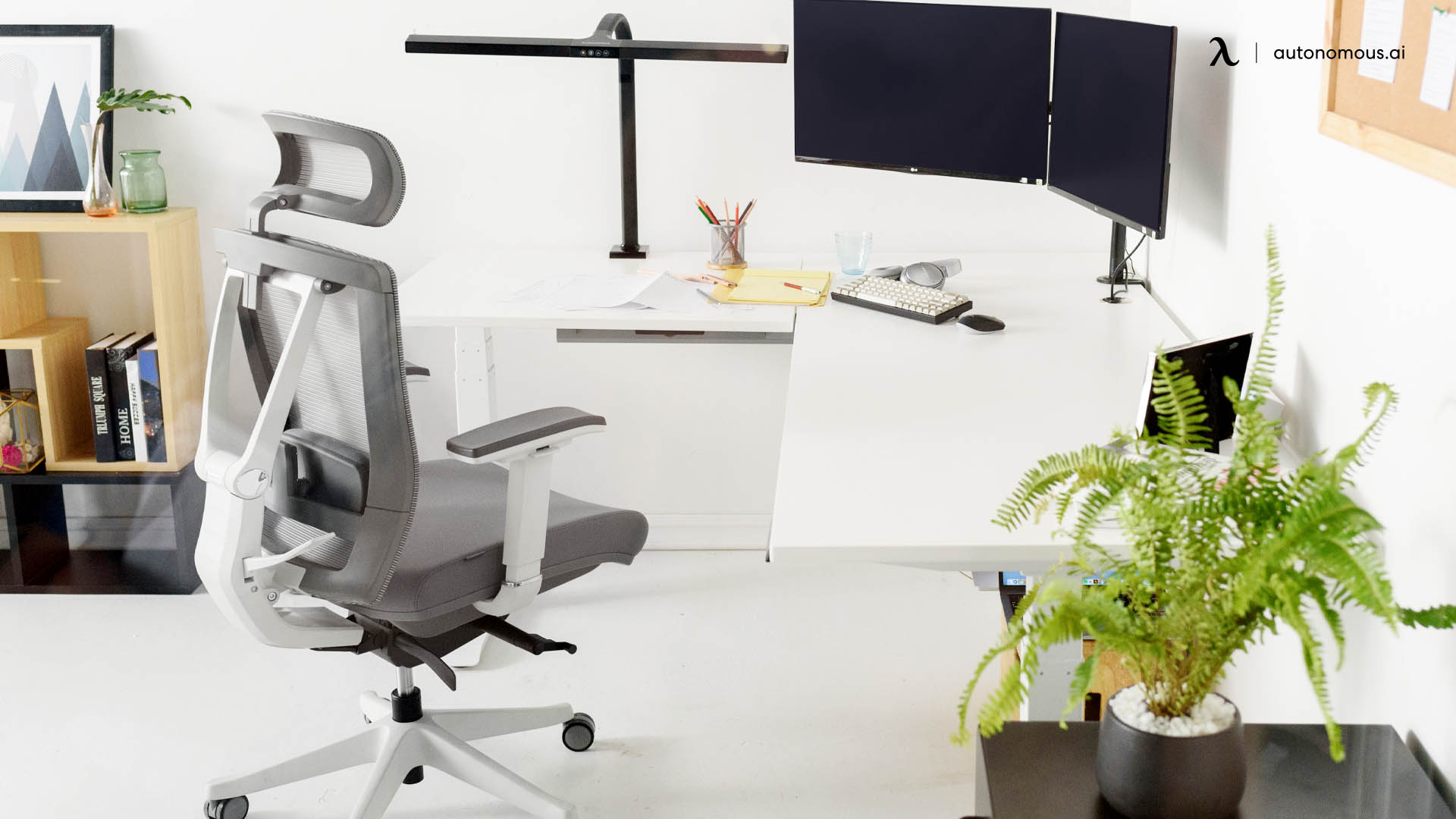
2.4. Oval or Round Desks: Collaboration and Connection
Oval or round desks promote collaboration and unity, making them ideal for shared workspaces or team environments. The lack of sharp corners ensures that energy flows evenly, fostering a sense of equality and mutual respect among users.
In solo settings, round desks can encourage open-mindedness and creativity. However, they may not provide the structure needed for highly task-oriented roles, so consider pairing them with clear organizational tools to maintain focus.

2.5. Standing Desks: Flexibility and Health
Standing desks are increasingly popular for their health benefits, and they align well with Feng Shui principles when used correctly. They encourage movement, enhancing energy flow and reducing stagnation.
The key to integrating a standing desk into a Feng Shui workspace is to ensure its position and height support both comfort and productivity. Alternating between sitting and standing helps maintain balance and focus, preventing fatigue while promoting overall well-being.
.webp)
SmartDesk 5
| Dimensions | 53"L x 29"W x 1.2"H |
|---|---|
| Colors | Stone Desert, Titanium White, Meteor Grey |
| Material | HDF wood Special customize sealing paint based on Green Standard |
| 2-Stage frame | 3-Stage frame | |
| Motor type | Dual | Dual |
| Lifting speed | 1.2”/sec | 2.6”/sec |
| Lifting capacity | 330 lbs | 330 lbs |
| Noise level | 40 dB | 40 dB |
| Height range (with top) | 30.7" - 49.7" | 27.2" - 52.7" |
| Length range | 40.4" - 70.9" | 40.4" - 70.9" |
| Frame foot width | 26.4" | 26.4" |
| Material | SPCC steel | SPCC steel |
| Colors | Stone Desert, Titanium White, Meteor Grey | Stone Desert, Titanium White, Meteor Grey |
| Outlet voltage | 110-240V | 110-240V |
| Anti - collision | Yes | Yes |
Choosing the Right Desk Shape for Your Needs
The ideal desk shape depends on your role, workspace, and energy needs. For task-oriented roles, a rectangular or L-shaped desk offers structure and organization. Creative professionals may benefit from the fluidity of a curved or round desk, while standing desks cater to individuals prioritizing health and flexibility.
Incorporating Feng Shui principles into your desk shape selection ensures that the workspace aligns with your intentions and promotes a harmonious flow of energy, making every day at work more productive and fulfilling.
3. Desk Color in Feng Shui
In Feng Shui, colors play a crucial role in influencing the energy and mood of a workspace. The right desk color not only enhances your productivity but also aligns with the desired energy flow in your environment. Whether you’re seeking stability, creativity, or focus, understanding the symbolism of colors can help you make a thoughtful choice.
For offices, explore the best Feng Shui colors to select hues that promote balance and positivity. If you’re working from home, check out this guide on home office Feng Shui colors to harmonize your work and personal spaces effectively.
3.1. Neutral Tones: Balance and Calm
Neutral tones such as white, beige, and light gray are popular for desks because they promote balance, clarity, and calmness. These colors create a clean slate for mental focus, reducing distractions and encouraging organization.
- White: Represents purity and simplicity. It enhances clarity and focus, making it ideal for detail-oriented work.
- Beige: Adds warmth and stability, creating a comforting atmosphere.
- Light Gray: Associated with the metal element, it fosters precision and clear thinking.
These colors are versatile and work well in both home and corporate offices, complementing most décor styles.
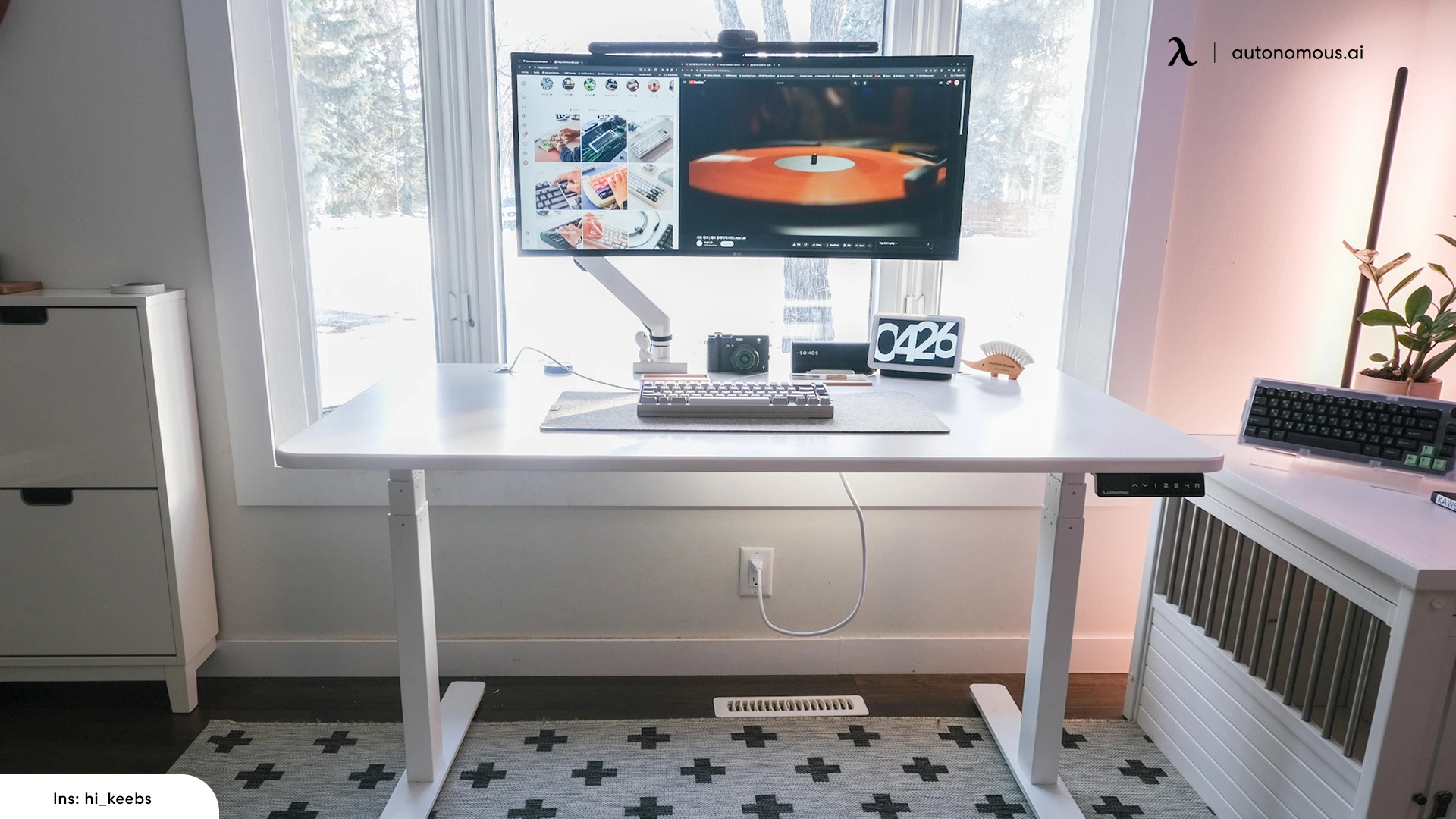
3.2. Earth Tones: Grounding and Stability
Earth tones like brown, tan, and terracotta are excellent for creating a grounded and stable workspace. These colors connect you to nature, fostering a sense of security and balance.
- Brown: Symbolizes reliability and grounding energy, making it ideal for long-term projects or tasks requiring deep focus.
- Terracotta: Adds warmth and vibrancy, promoting a balanced mix of energy and calm.
- Yellow Ochre: Encourages optimism and mental clarity, uplifting the overall energy in the workspace.
Earth tones are particularly beneficial for individuals seeking stability and focus in fast-paced or high-pressure roles.
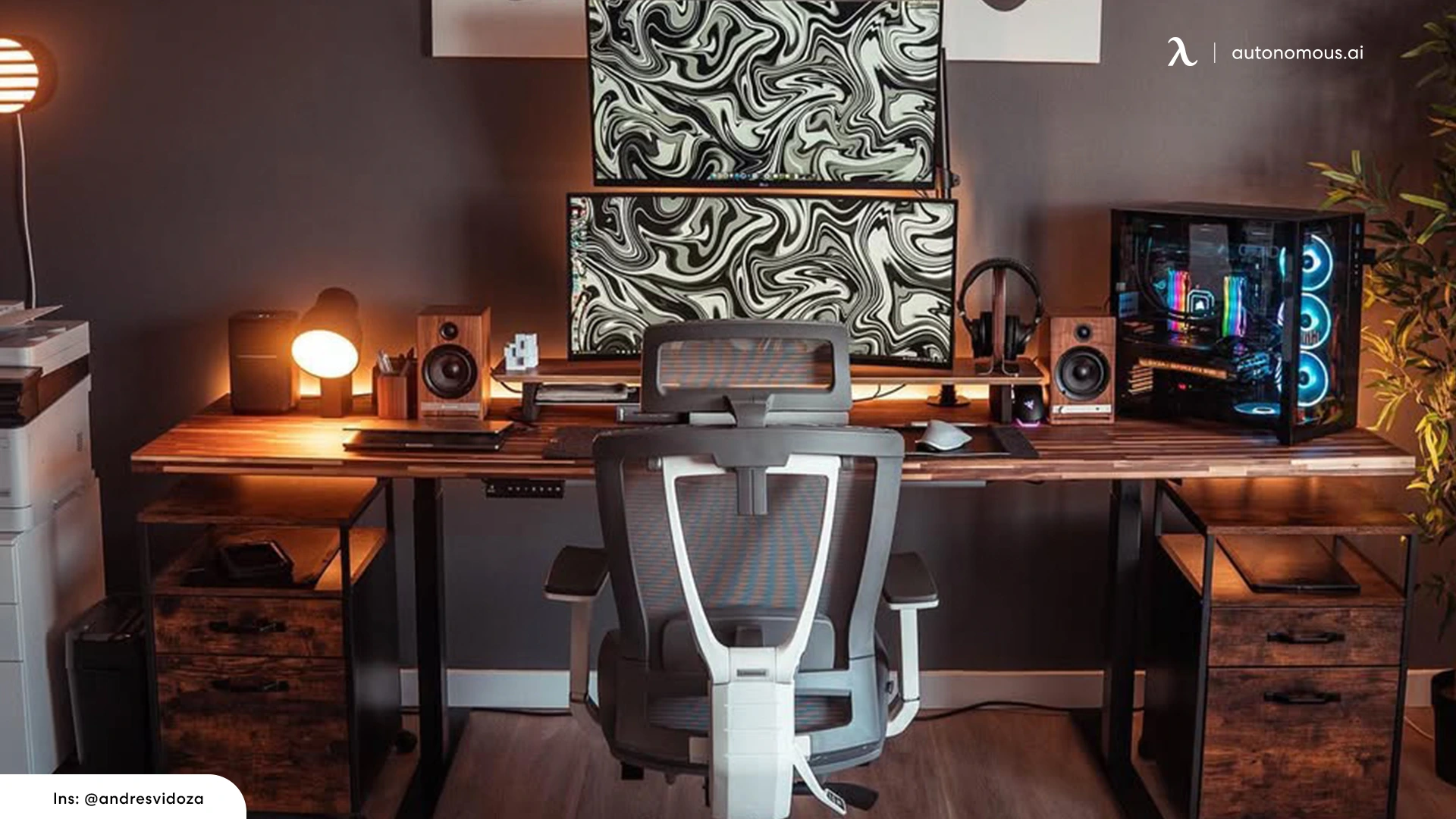
3.3. Green: Growth and Creativity
Green is one of the most auspicious colors in Feng Shui, symbolizing growth, renewal, and vitality. It inspires creativity and encourages fresh ideas, making it an excellent choice for artists, writers, and designers.
Incorporating green into your desk setup—either through the desk color or with greenery like plants—adds a rejuvenating energy to the workspace. Darker greens offer grounding energy, while lighter shades spark creativity and openness.
3.4. Blue: Calm and Focus
Blue represents calmness, focus, and trust. It’s an excellent choice for individuals in analytical or strategic roles, as it promotes clear thinking and reduces stress.
- Light Blue: Brings a soothing energy, making it ideal for tasks requiring patience or empathy.
- Deep Blue: Fosters concentration and confidence, suitable for roles involving decision-making or leadership.
Blue is particularly effective in shared workspaces, as its calming properties reduce tension and encourage collaboration.

3.5. Black: Depth and Inspiration
Black, associated with the water element in Feng Shui, symbolizes depth, introspection, and inspiration. While it’s not a common choice for desk surfaces, accents of black can stimulate creativity and enhance problem-solving abilities.
Black standing desks or frames are best balanced with lighter or warmer colors to prevent the workspace from feeling too heavy or oppressive. Pairing black with green or white creates a balanced and harmonious energy flow.
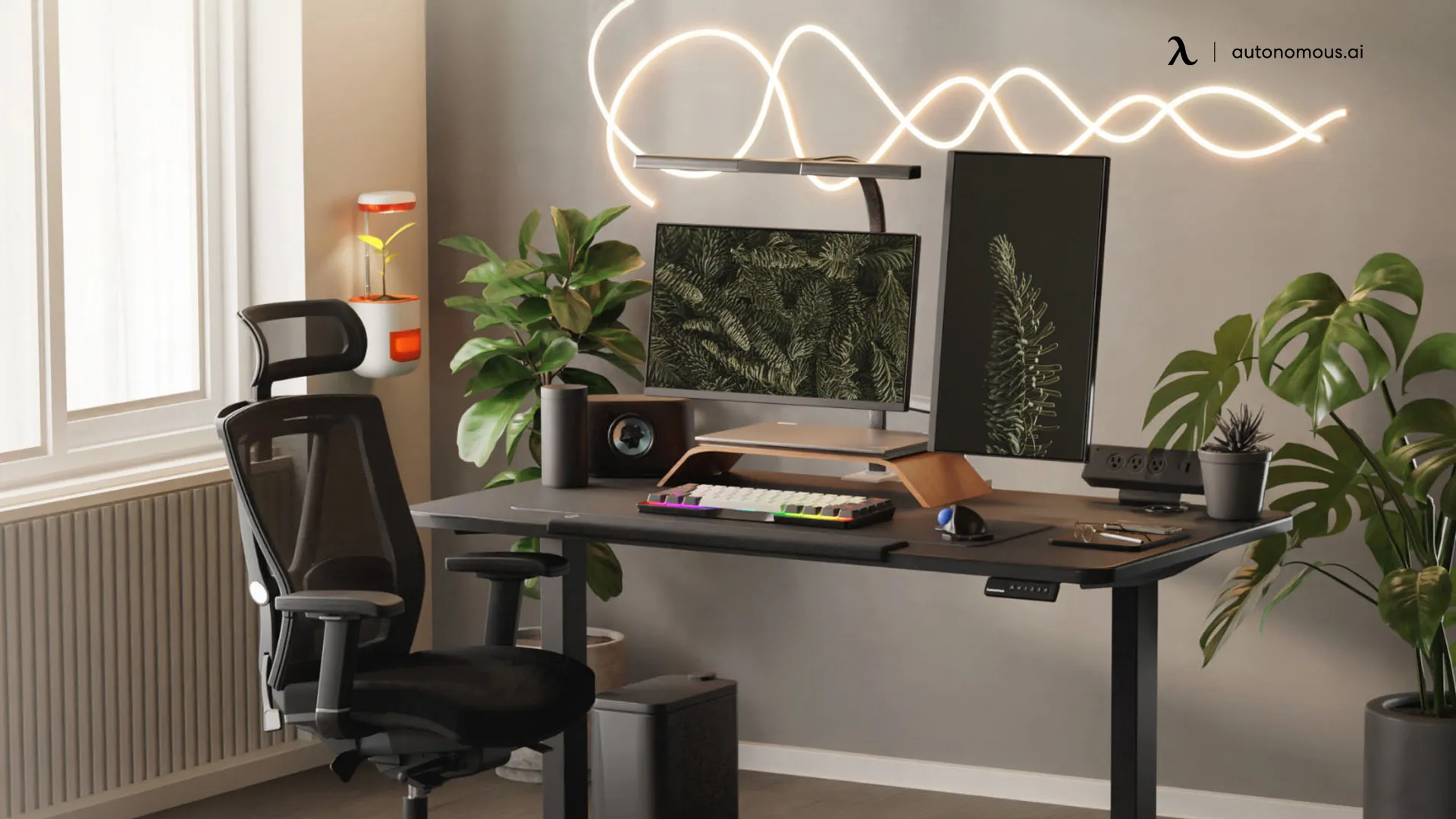
3.6. Pops of Color: Enhancing Energy
For individuals who prefer neutral or natural tones for the desk itself, adding pops of color through accessories or nearby décor can amplify energy and create balance.
- Red: Encourages passion and energy but should be used sparingly to avoid overstimulation.
- Yellow: Brightens the space and promotes optimism.
- Orange: Sparks creativity and enthusiasm, making it a good choice for brainstorming zones.
These accents can be introduced through items like desk organizers, artwork, or even chair upholstery.
Personal Connection and Balance
Ultimately, the color of your desk should resonate with your personal energy and work goals. Choosing a color that feels natural and supportive to your needs will help create a workspace that aligns with your intentions. Balance is key—pair vibrant or dark colors with lighter tones to maintain harmony in your environment.
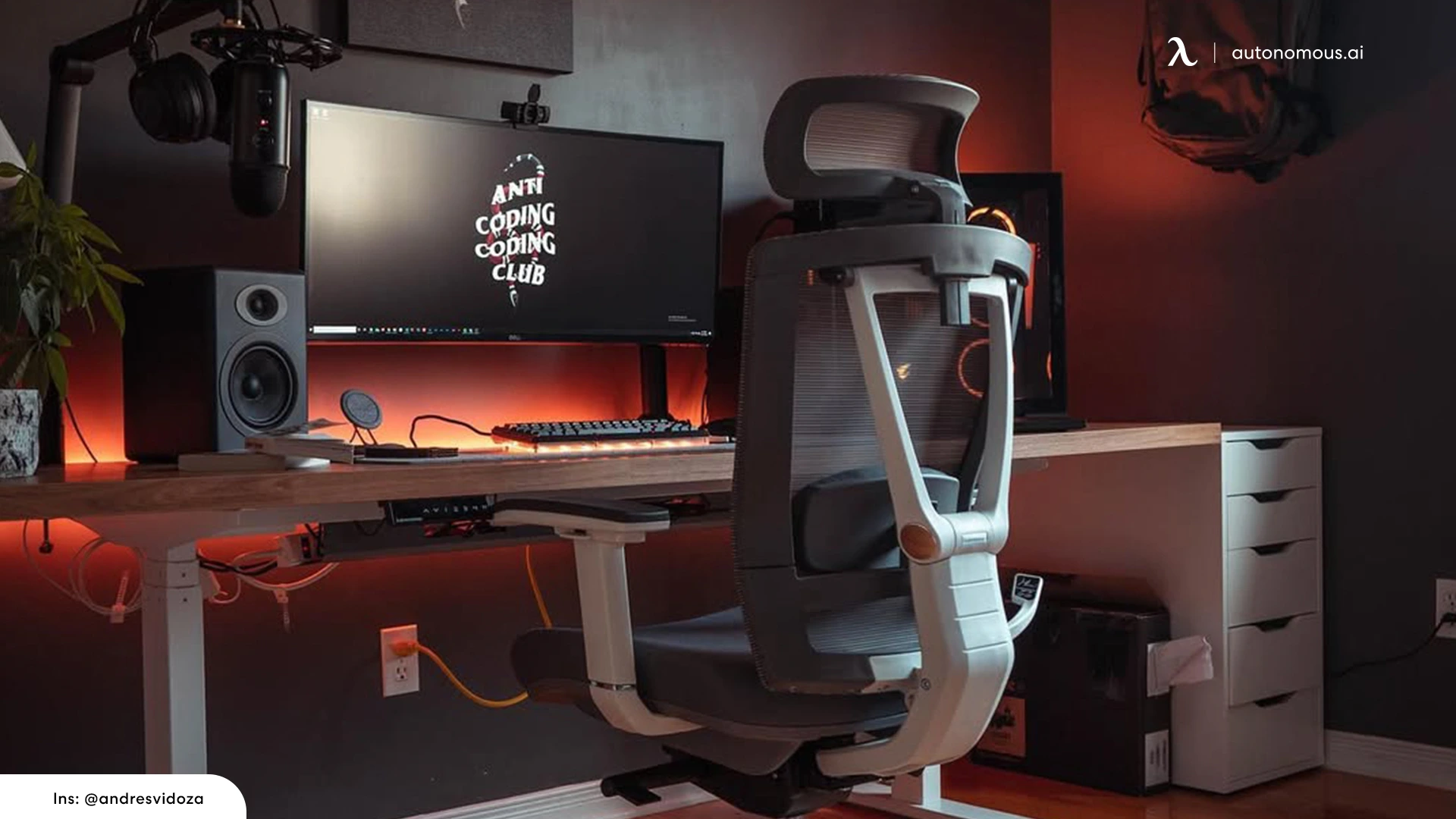
4. Feng Shui Desk Placement
Desk placement is a fundamental aspect of creating a harmonious workspace in Feng Shui. The position of your desk not only influences how energy flows through the room but also impacts your focus, productivity, and sense of control. Placing your desk with intention can help you cultivate a workspace that aligns with your personal and professional goals.
4.1. The Commanding Position: Taking Charge of Your Space
The commanding position is the cornerstone of desk placement in Feng Shui. This position ensures you are in a place of authority and control within your workspace.
- Ideal Placement: Position your desk diagonally opposite the door while ensuring you have a clear view of the entrance. This placement allows you to "command" the room, symbolizing awareness and preparedness for opportunities.
- Avoid Facing Directly Toward the Door: Sitting in direct alignment with the door can create a rush of energy toward your desk, leading to feelings of overwhelm or distraction.
Having a solid wall behind you when in the commanding position adds support and stability, reinforcing a sense of security in your career and personal endeavors.
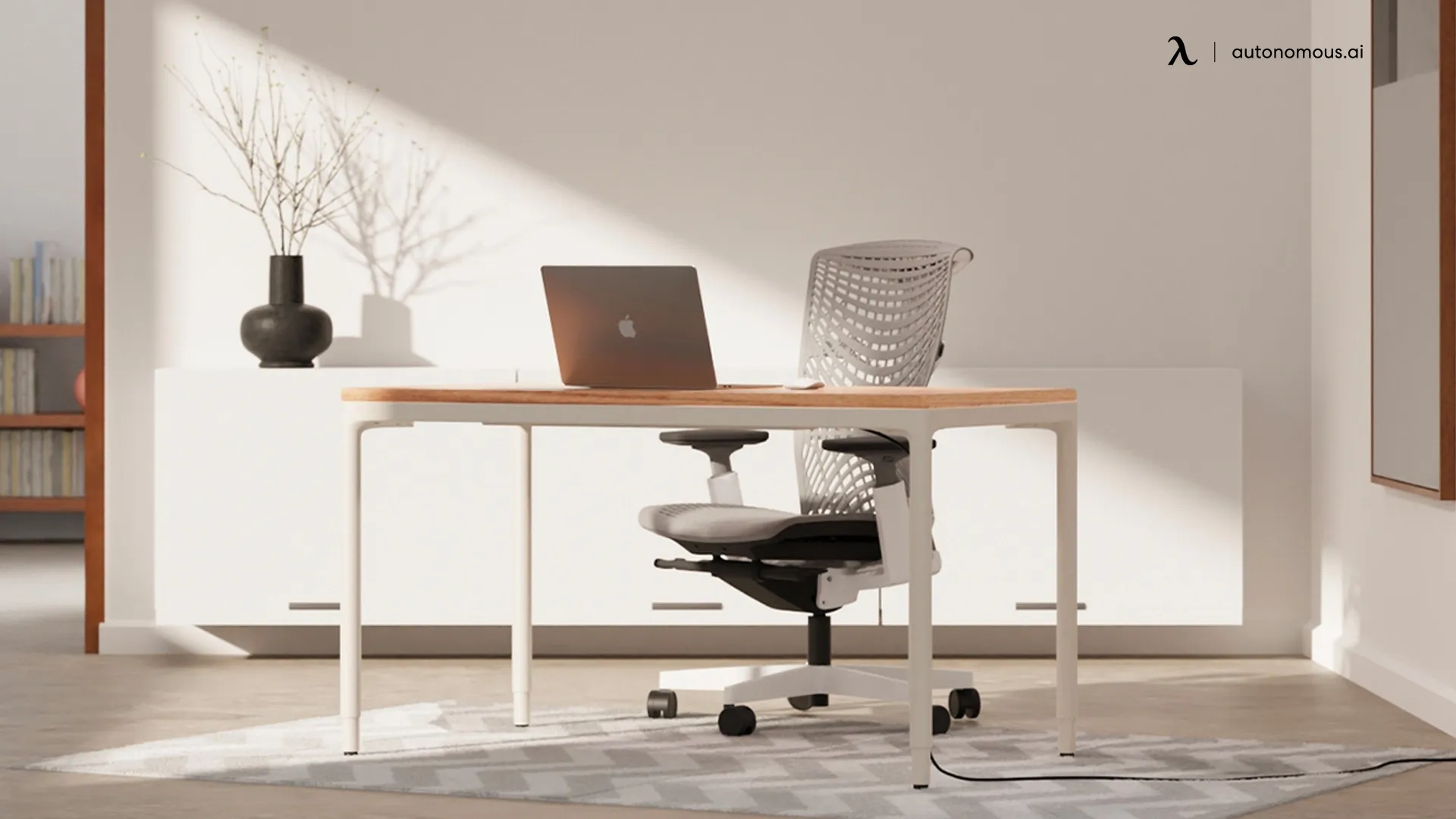
4.2. Avoiding Common Pitfalls
While the commanding position is ideal, many workspaces may not allow for perfect alignment. In such cases, there are adjustments you can make to balance energy:
- Avoid Facing a Wall:
Sitting with your face toward a wall can create mental blocks or feelings of confinement. If this setup is unavoidable, place artwork or a mirror on the wall to create depth and stimulate energy flow. For detailed strategies, refer to this guide on Feng Shui desks against walls to make the most of your workspace while maintaining positive energy.
- Back to the Door:
Sitting with your back to the door can lead to a sense of vulnerability and unease. To counteract this, position a mirror on your desk to reflect the entrance, allowing you to see who enters while remaining seated.
- Facing a Window:
Placing your desk directly in front of a window may lead to energy dispersal, making it harder to concentrate. Use sheer curtains or blinds to soften the energy flow and avoid glare. For more insights on optimizing this setup, check out this guide on Feng Shui office layouts with windows to create a harmonious and focused environment.
4.3. Feng Shui Placement Based on Personal Energy
In Feng Shui, personal energy and auspicious directions, calculated using your Kua number, can further refine desk placement.
- Sheng Chi (Success): Position your desk to face this direction to attract opportunities and career growth.
- Fu Wei (Growth): Aligning your desk with this direction fosters personal development and learning.
To calculate your auspicious directions, use your birth date and gender to determine your Kua number. Incorporating these directions enhances the alignment of your desk with your personal energy.
4.4. Balancing Desk Placement in Shared Workspaces
In shared or collaborative work environments, achieving ideal desk placement can be challenging. Focus on these adjustments to maintain harmony:
- Avoid Clashing Directions: Ensure that desks do not directly face each other to prevent conflicting energy. Instead, angle desks slightly or use dividers to create a sense of personal space.
- Enhance Collaboration: Use round or curved desks in shared workspaces to promote unity and reduce tension.
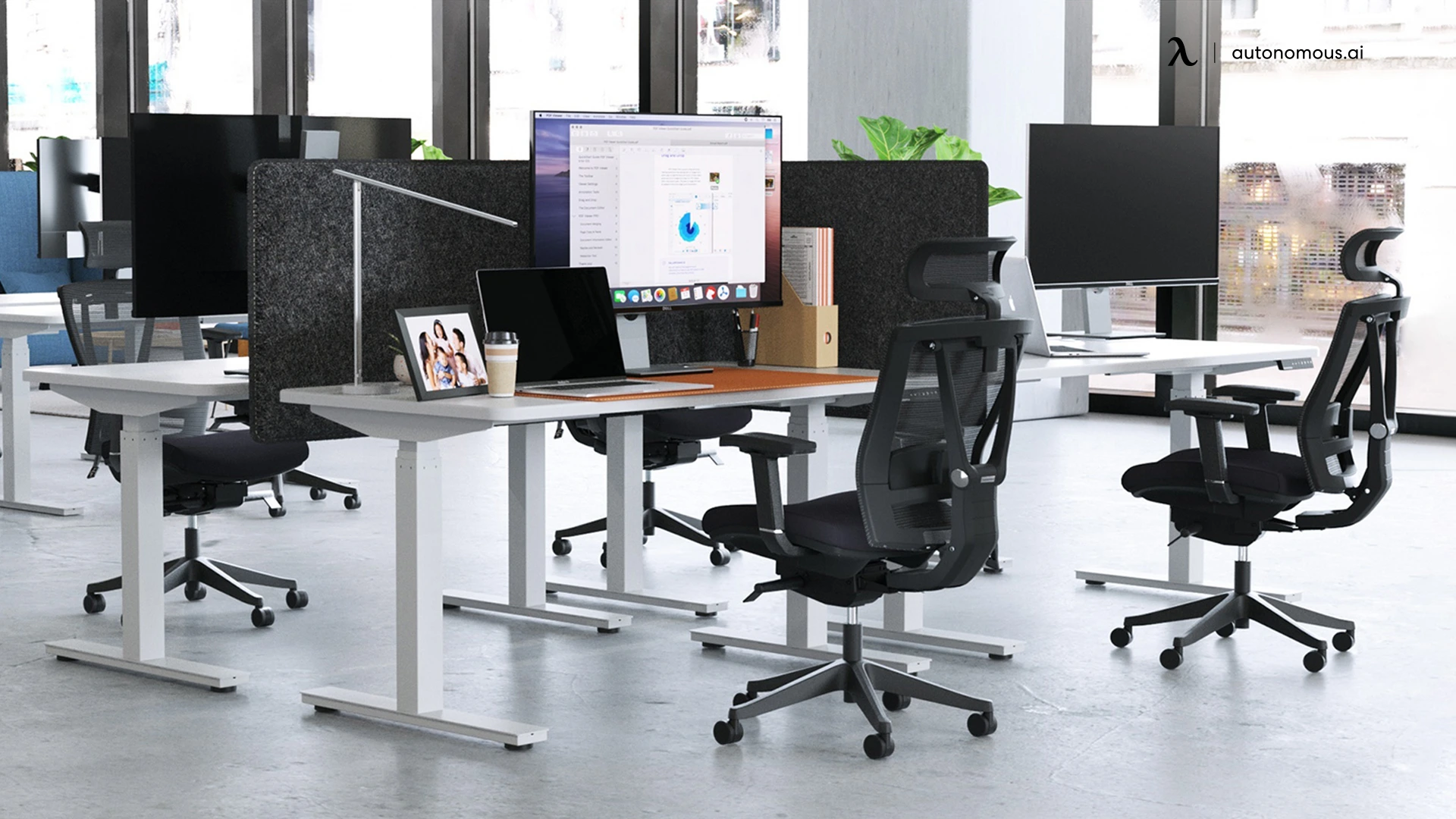
4.5. Optimizing Placement in Small Spaces
Limited space can make ideal desk placement difficult, but thoughtful adjustments can still align your workspace with Feng Shui principles:
If your desk must be placed against a wall, ensure it is near a window to invite natural light and use decorative elements like mirrors or artwork to expand the space visually.
For home offices located in bedrooms, maintaining a clear distinction between rest and work areas is essential in Feng Shui. This separation prevents the energy of productivity from interfering with relaxation and vice versa. Using dividers or screens can create effective boundaries, ensuring each zone serves its purpose.
In smaller spaces, innovative layouts can help maximize functionality. Explore these small bedroom office combo ideas for inspiration. If you’re wondering how to position your desk effectively, check out these bedroom layout ideas with desks to harmonize both work and rest areas.
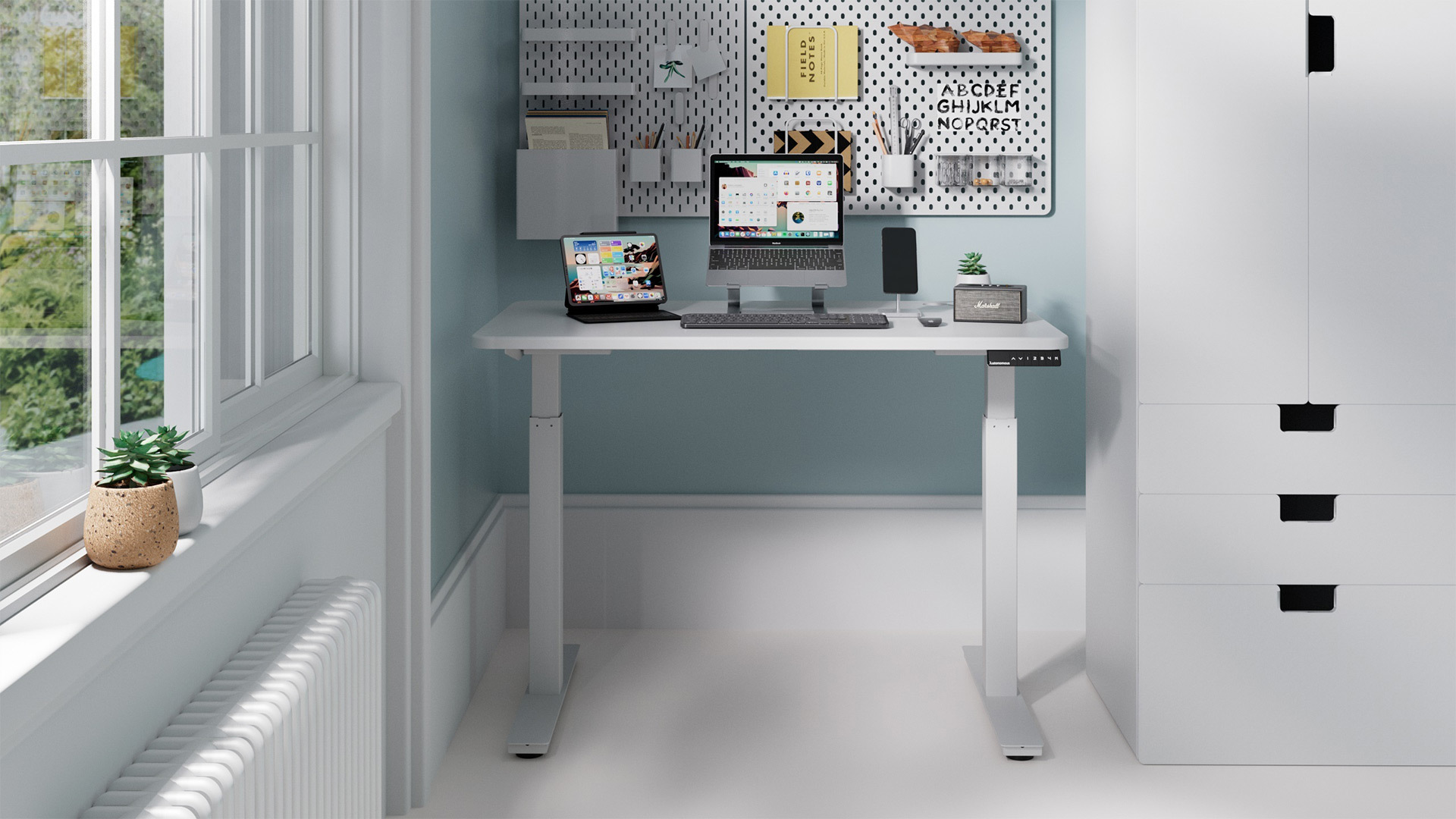
5. Feng Shui Office Desk Items & Decorating Ideas
The Feng shui desk setup is divided into nine spaces according to the bagua map.
- Wealth and Prosperity
The back left corner of the desk is dedicated to abundance. This area is a favorite spot for a good luck plant if you aren’t on the material side, and in case you are, you can always go with a laptop, or something antique and expensive to channel the flow of wealth towards you.

- Fame
For some of us, being recognized and adored is more important than most things. The center back of the bagua map is what you should be targeting to make sure your celebrity points go up. A picture of a recent achievement, a promotion letter, or a graduation photo may be fitting ideas for this spot.
- Love and Relationships
If you want to be a lover, not a fighter, turn your gaze to the back right corner and make sure you have something romantic to focus on. If you’re in a relationship, a picture of your sweetheart. If you’re single and ready to mingle, maybe your favorite flower.
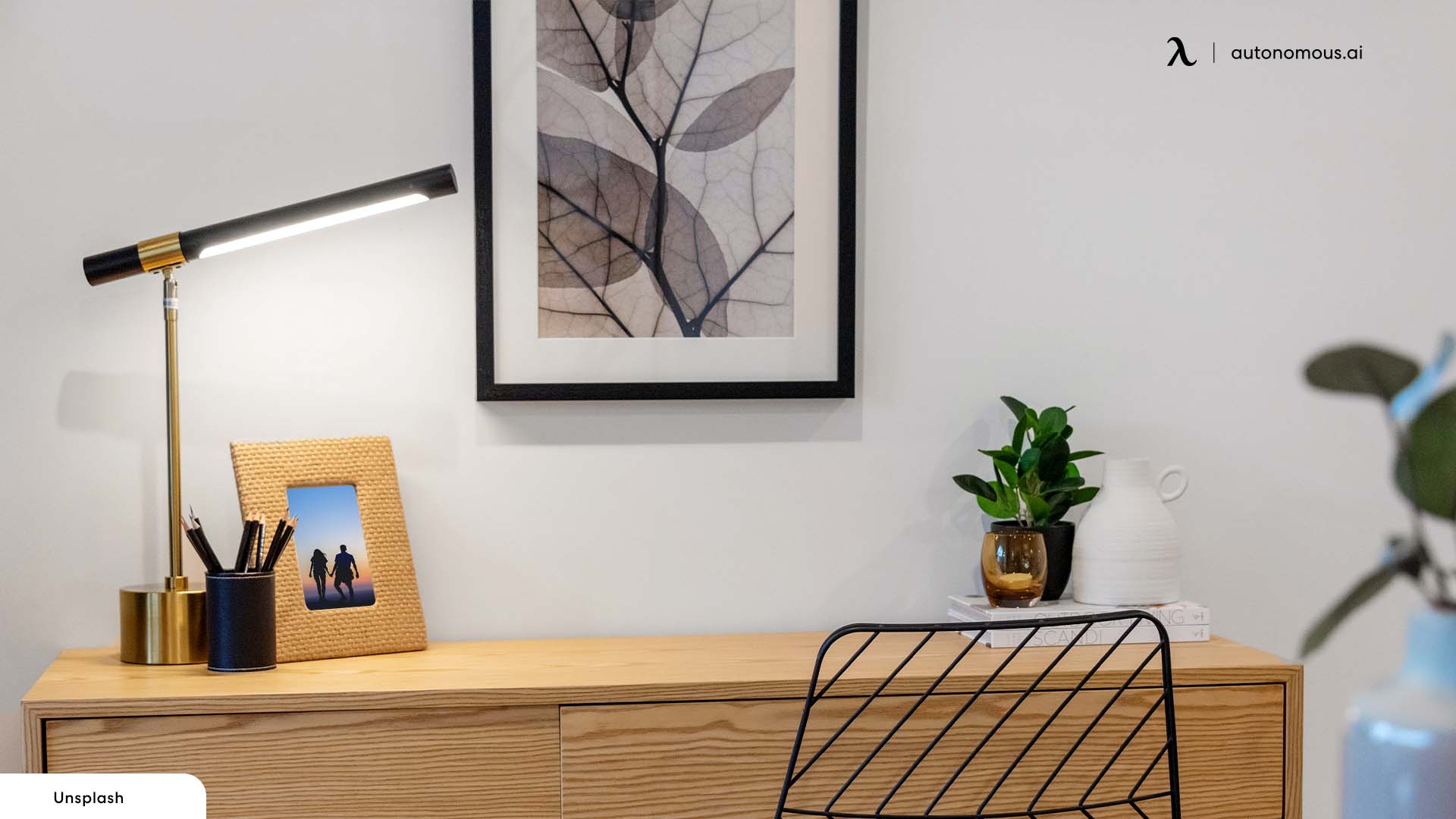
- Family
On the left center of the desk, you may want to keep a family photo or a family heirloom. This spot on your Feng shui desk is dedicated to what’s thicker than water.
- Health
The center area of the desktop is dedicated to the greatest wealth there is. Your personal health. Keeping this area free of clutter is the way to go. If you want to benefit physically also, maybe opt for a sit/stand Feng shui desk. The sit/stand desk enables you to stay more active and avoid the harmful effects of slouching away at the seat.
- Creativity
The right center of the grid is a splashing ground for your creative juices. Whatever art form you prefer or are attached to, will go well here and hopefully boost your creative spectrum.
- Knowledge and Wisdom
Place some reading materials, a dictionary, or an icon of knowledge on the front left corner of the desk. This spot on your Feng shui desk is for increment in the power of knowing.
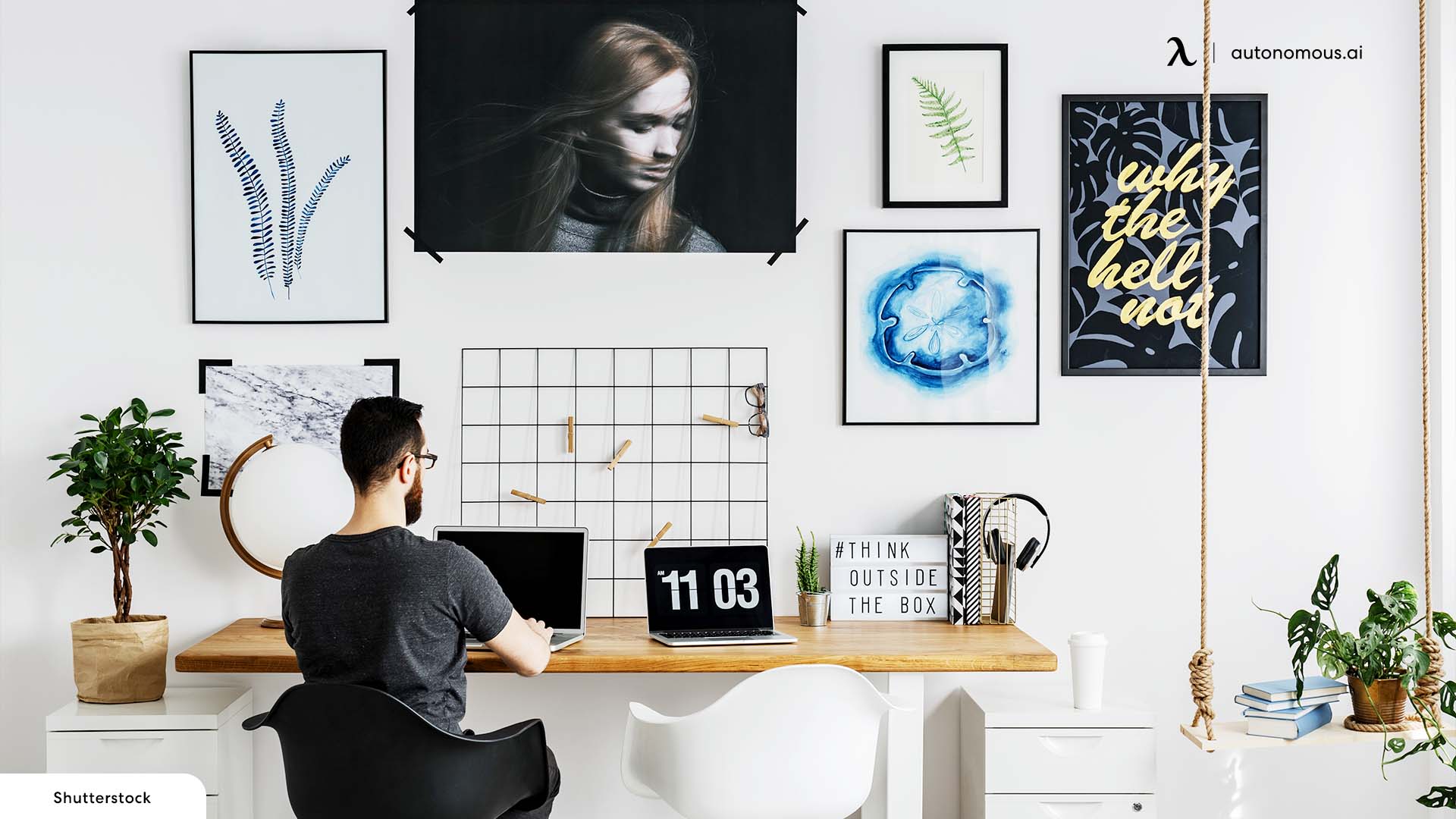
- Career
Front and center of your Feng shui desk is for your career. Keeping this space free or placing something directly in lieu with your work may be the best option.
- Helpful People and Travel
If you’re in need of help, (as everyone in this life is), focus on the front right section. This area also represents travel, so a travel guide might also serve the purpose.
6. The Importance of Feng Shui Desk in Office
The practice of Feng Shui enables you to get the most out of life by simply channeling your inner chi. Your office is a place where you spend so much of your time, so it only makes sense for it to be a main focus if you intend to follow this agenda. Whether you’re designing a home office or a Feng Shui office cubicle, opting for a Feng Shui desk has multiple benefits, including improved energy flow, enhanced focus, and a balanced work environment.
It makes sure you’re organized: Organization and discipline are considered the main principles for achievement. A Feng shui desk automatically reboots your system and makes sure you keep things organized in your workspace, putting you in a mindset of task management. This is translated into the rest of your work.
A Feng shui desk makes sure you always have eyes on what’s valuable: The specific arrangement of a Feng shui desk makes sure that the most valuable aspects of your life are near and present.
Your Feng shui desk position is a rather important aspect when it comes to the flow of your inner chi. Your Feng shui desk direction should be facing towards the door so you can see anyone who comes in, but to enhance a power position, it should be as further away as possible from the door also.
It will also help if you have a solid wall or a row of plants behind your seat as these introduce natural elements around your Feng shui desk.
If you do not want to limit yourself to a standard desk you can always opt for an L-shaped desk. L-shaped desk Feng shui is as achievable and beneficial as a normal desk, with the bonus of added space.
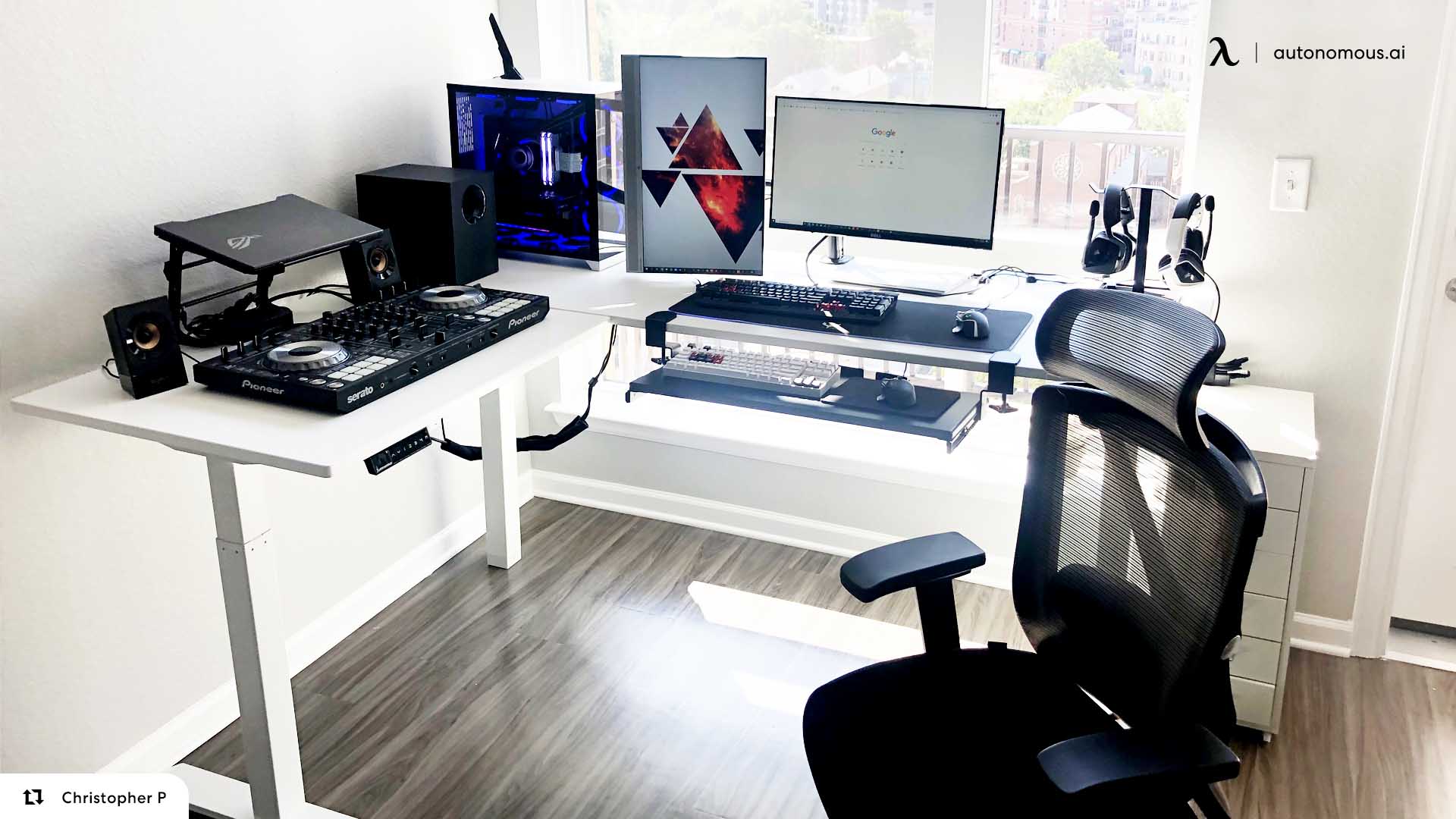
7. FAQs
What to Avoid When You Set up Your Feng Shui Desk?
The biggest thing to avoid when trying to build a Feng Shui layout for your office space is clutter. With all the elements an office desk Feng Shui requires, it may be easy to get carried away and have too many things in front of you, which can end up being counterproductive. A standing desk with cable management can help maintain a tidy and organized workspace by keeping wires hidden and reducing visual distractions, allowing you to fully embrace the harmonious principles of Feng Shui.
Another area to look out for is sharpness. Make sure any sharp objects are avoided, and if that isn’t possible, keep them facing away from you.
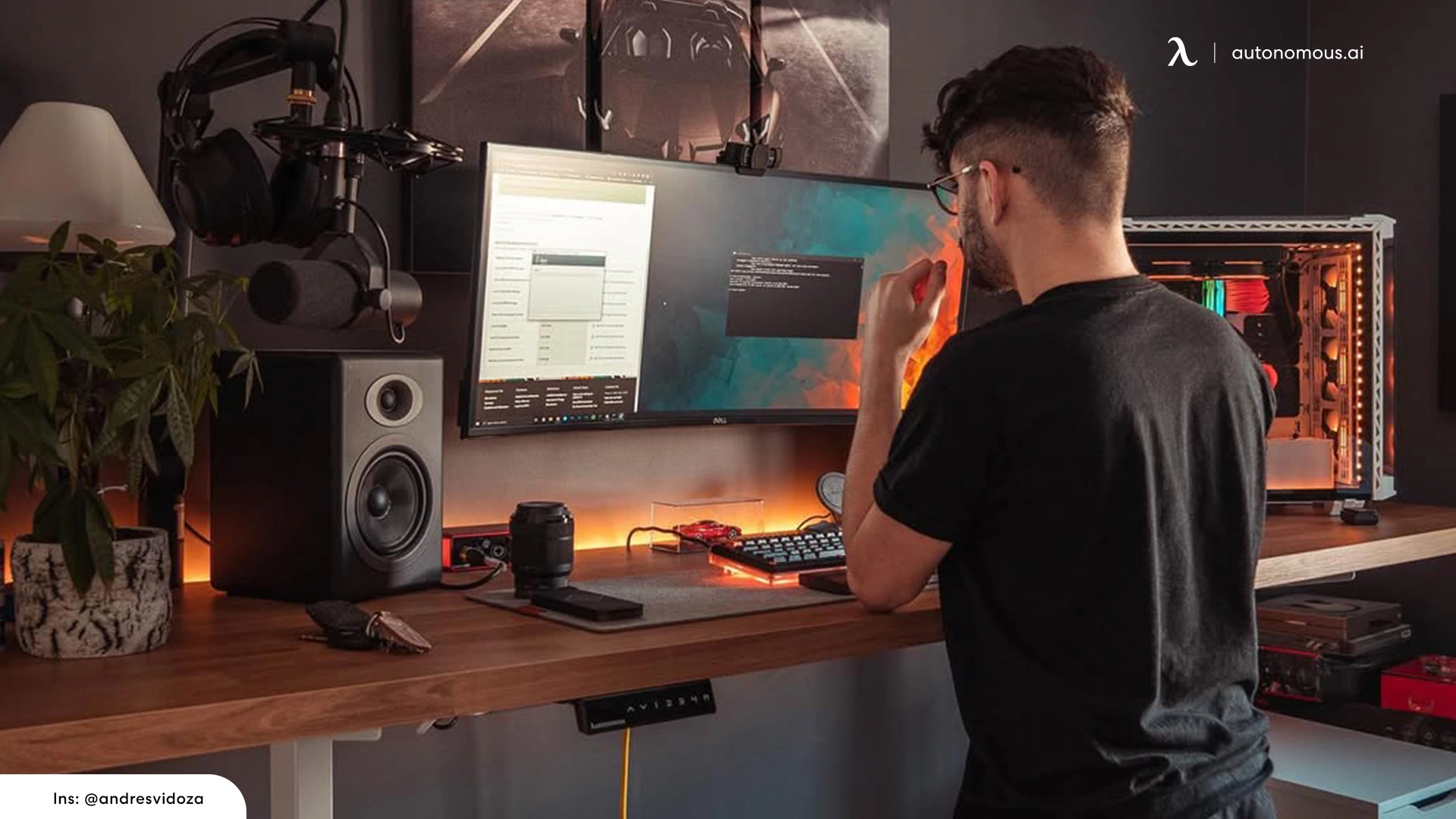
How to Make the Whole Space Count
The Feng shui concept does not have to be limited to your desk. To create an atmosphere that’s balanced and positive, you can have a Feng shui office layout.
The easiest step in this is to incorporate Feng shui colors into your office theme. These will automatically help in putting your mind at ease, every time you walk into your office space.
The great part about Feng shui is that it isn’t limited to just work spaces. You can embrace this as an organizational aesthetic in your general life. For example if you want to redecorate in the Feng shui method, or opt for a desk placement in your bedroom.
Adding a Feng shui desk or going for a Feng shui office layout is just the beginning. If you’ve opted for this setup, your outlook on life must also be positive and resourceful. Only then can you actually harness your inner chi and reap the rewards.
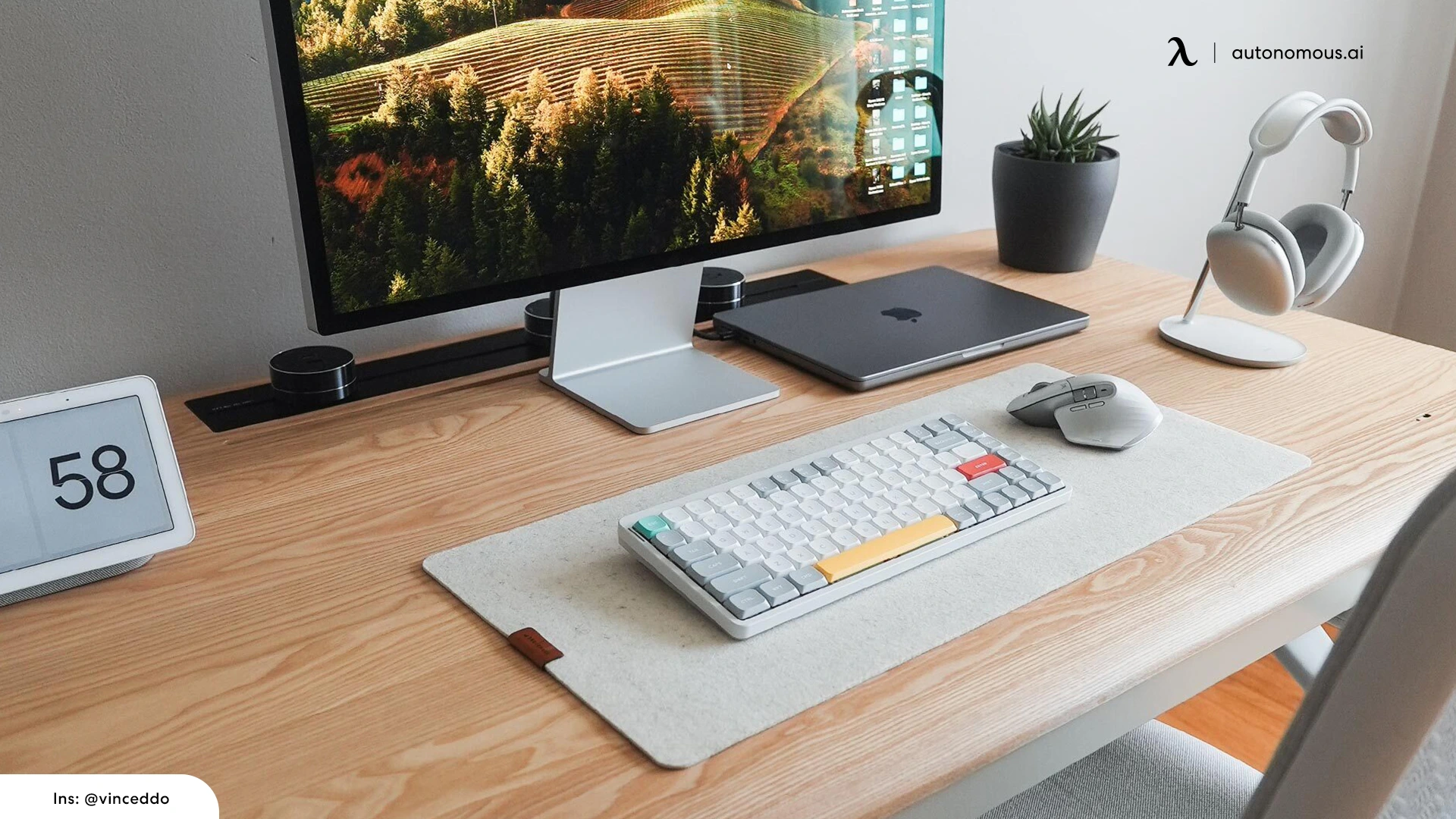
Conclusion
If you want to Feng Shui your work desk, you now know it is possible. We’ve talked about the different materials and supplies you need. However, we mainly focused on the placement of the desk so that it’s in line with Feng Shui practices. You also learned what colors to consider for the chair and desk and why an office desk might be the right solution for your productivity needs.
The choice is ultimately yours, but when you make office desk Feng Shui, you can have more peace and relaxation throughout your workday. To make it even better, light a scented candle, and meditate at different times during your day.
For insights into future trends, explore office Feng Shui 2025 and discover evolving principles that can shape your workspace. If you’re focusing on current practices, this guide on Feng Shui office 2024 provides actionable tips to optimize your desk setup for success.
Stay connected with us!
Subscribe to our weekly updates to stay in the loop about our latest innovations and community news!
Interested in a Link Placement?
.svg)
.svg)




/https://storage.googleapis.com/s3-autonomous-upgrade-3/production/ecm/230914/bulk-order-sep-2023-720x1200-CTA-min.jpg)

/https://storage.googleapis.com/s3-autonomous-upgrade-3/production/ecm/230824/Alex-28a9a700-5aef-45ab-918e-1bbc4cc5722e.jpg)